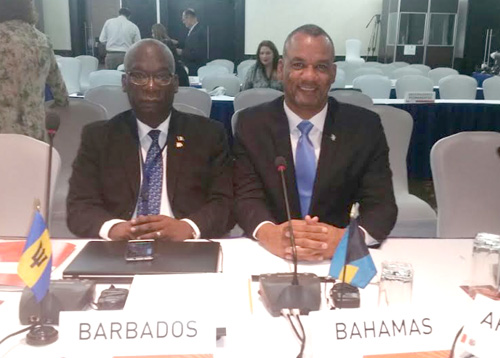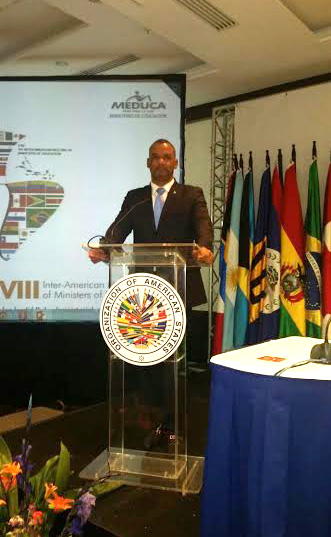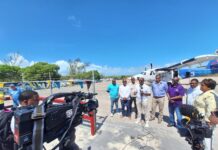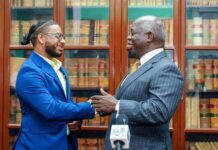

Bahamas Minister of Education, Science and Technology, the Honourable Jerome Fitzgerald, M.P., spoke during the Fourth Plenary Session: The Collaborative Approach of the Inter-American Education Agenda: Cooperation Practices focusing his address on “The importance of regional cooperation for educational development. Practices to share by The Commonwealth of The Bahamas”.
The Minister took the opportunity to share with Education Ministers from the region and members of the Organization of American States (OAS), the initiatives and programs of the Ministry of Education, Science and Technology and the Department of Education geared towards improving the quality of education in our public school system.
The Minister told his regional colleagues that upon becoming Minister of Education, there were two questions he sought to answer in order to have a clear understanding of the task at hand and to ensure that all decision made were driven by these question. He stated that to some these would appear as simple question while other would regard them as complex.
Those two questions:
1. What is the purpose of school?
2. What is the purpose of education?
These two questions then led to additional questions, should all schools be alike and should all students be taught the same way and expected to learn the same way? Minister Fitzgerald admitted that the honest and objective answers to these questions have been very revealing.
The Minister noted that many jurisdictions have not augmented their approach to education and have taught the same thing year after year, using ineffective methods and appearing mystified when we yielded the same results.
Minister gave statistic reflecting the graduation rate for the past 15 years, which showed the graduation rate to be at 50% which is also common in many parts of the world. The stark reality he said is that approximately 2,500 students do not meet the graduation criteria each year and over the years that number accounts for 35%-38% of the current workforce. This then led to one of the Minister’s major points in his remarks; that “education is the driving force for the success of any nation. It is a matter of national security.” The Minister then quoted Dr. Ben Levin who outlines the cost to a nation when the education system is inadequate. Dr. Levin states that countries will experience five socio-economic problems and failures as a direct result of poorly educated citizens:
1. “Foregone national income, GDP;
2. Foregone tax revenues for the support of government services;
3. Increased demand on social services;
4. Increased crime, and
5. Poorer levels of health.”
Simply put, a poorly educated populace leads to a decrease in tax revenue and GDP, increased demand on social services, health services and safety services.
The Minister shared his strategy for revolutionizing education in The Bahamas. “I embraced the challenge and opportunity that would beset my country’s educational progression. I undertook a decision to change the thinking of senior educators; essentially those persons who had been doing the same things for decades.”
Minster Fitzgerald outlined some of his initiatives starting travels to three of the top performing education systems in the world where in depth observation, discussion and consultations took place. “Of course, the understanding was that one shoe doesn’t fit all and every culture is different; and just because something works somewhere doesn’t mean it will work at home. We visited Finland, Ontario Canada and Singapore and this year we intend to travel to Australia and New Zealand.”
He shared that the results were not so much in what was happening in the classroom as much as what was happing at the government level. “What we collectively found interesting was that over the past ten to twenty years or so, the countries visited had surpassed traditional countries as model educational systems. We sought to find the most important factor for these countries sudden rise in academic output and rankings. The answer was surprising. We found that the most important factor to the success of their educational models lied in the POLITICAL WILL TO EFFECT CHANGE. Yes clear goals and measuring tools that were transparent played a major role. But it started with the Political Will!”
The Minister further emphasized the importance political fortitude in educational reform. “It is a given that politics can make changes to an educational system which is difficult or challenging. Substantive change in an educational system can take ten to twenty years of intense sustained political will. It is not glamorous. It is grunge work. Not the kind of thing that excites the usual politician, and certainly not the kind of thing that wins elections in most countries. In fact, one education minister can find himself at the beginning of this type of change and another at the end. Which is why taking the political will to begin a process of significant change in education is not one of instant gratification, and more than often is one without any individual celebration. It is a cohesive, collective process and one that demands perseverance. So we know the most important factor to the social and economic sustainability and growth of a country is education. We also know that the most important factor in changing and sustaining change in an educational system is Political Will.”
“In a quick overview I will discuss the 5 areas we have identified which require constant attention if there is to be any meaningful improvement in academic performance. These will not come as a surprise to you, as some were discussed previously at our meetings in 2007, 2009, 2012 and the Chair of this meeting has also listed some as the areas of priority at this meeting. Interestingly enough however, it is important to appreciate how quickly one can lose focus if continuous attention isn’t placed on determining if our decisions and allocations of resources both human and financial are directly impacting these areas:
1. School Leadership. The Most important person in a school to me is the Principal. The Leader. There is a saying that I would rather go to war with a pack of lions led by a sheep than a herd of sheep led by a lion. Yet most educational systems spend little or no time developing and training its future leaders. A simple question, does the Principal possess the skill set necessary to lead a 21st century school and have we identified those skill set and instituted the training and selection process to choose the best leaders for our schools? In the Bahamas we are now for the first time establishing a path for principals and administrators whom the Ministry of Education will identify as entrants into a program that prepares teachers to become school leaders and mentors.
2. Teacher Training. Training and retraining. What are we doing improve our teachers skills and keep them relevant? Recently we opted to close a primary school which we are in the process of converting it into a multi-faceted teacher training and professional development institute. We have now negotiated and mandated in the new Collective Bargaining Agreement with the Bahamas Union Of Teachers that teachers must have ongoing professional development especially in areas identified that need improvement . We could not have arrived at this agreed position if we did not commit to put millions into this facility. The thought was never to punish but to encourage and improve the teacher.
3. Establishing an Achievement Unit
The purpose of this unit is to:
➢ Bring equality to the education system so that all schools would be considered GOOD SCHOOLS.
➢ Collect and assimilate data so that the Minister and Director can make Data Driven Decisions to drive intervention in subject areas and schools where deficiencies are identified.
➢ Track every single student to ensure that whatever intervention is needed is given.
This unit is to ensure that no child slips through the cracks and gets swallowed up by circumstance. We can tell you how many students are deficient in English Language, Science, Math or Social Studies; their grade level, what schools they attend, who their teachers are, and several other pertinent details all geared towards incorporating the necessary intervention to meet the needs of our children.
We believe that only when an educational system is sufficiently focused toward elevating the bottom fifty percent can a country have a chance of achieving true equality. The educational system must give every child the opportunity and hope that they can achieve success and contribute meaningfully to the National Development of his or her country.
4. Special Education and Inclusive education. This is an area which we found is often overlooked in educational systems and that is those students with special rights. Research shows that as much as twenty-five to thirty percent of the student population are not learning to their full potential through conventional teaching modalities. Many of our teachers are ill equipped to diagnose let alone deploy the intervention strategies needed for that twenty-five to thirty per cent of the student population. To address this issue we leased a Catholic School which was closing, and renovated it to the tune of three million dollars.
This Special Needs School will offer a unique curriculum for children in the Bahamas diagnosed with mild to moderate learning and developmental disabilities. The school will serve as a model for public school classes and facilitate as a teaching, training and research site. Additionally, it will provide the best gains for bright students that struggle in the traditional academic setting, due to learning disabilities.
5. The expansion of pre schools. This one needs no explanation we are all aware of the research here. In the Bahamas, we are pushing aggressively to build more preschools so that by the year 2017 we can amend our Education Act to extend the mandatory entry age to four years old from the present mandatory entry age of five. We enacted the Early Childhood Care Act and Standards by which all pre schools and caregivers are governed by. A Council made up of public and private sector have the responsibility to license all Pre schools annually. A loan from the IDB allowed us to train over 100 pre school teachers at our local college over the past 4 years and completely renovate all of our preschools with the latest teaching tools and equipment.
We know that there is no perfect education system. But there are some best practices which are universal and bench marking which we can use to hold ourselves and those we lead accountable.
I return now to the first question I asked myself when I became Minister: What is the purpose of school?
The answer we concluded is that “School must be a place that is student focused. School must be a place where we meet the child where they are academically, and provide a curriculum that is germane to the career path that meets the child’s interest and the national needs of the country.”
The application of this formula means that when a child leaves school he or she can seamlessly transition into the workforce, an apprenticeship program or college, and thereby make a meaningful contribution to the development of his or her country.
It’s easy to say, indeed. The challenge always lies in the details and the implementation. But let me share a major initiative that my Ministry introduced last year which is a major feat. At the beginning of this school year we launched a standardized requirement for graduation and called it the Bahamas High School Diploma. The requirements had been debated within the Ministry for the past 14 years but we were unable to get educators and stakeholders to agree on the requirements. Until last year the only standard for commencement was a 2.0GPA and that was subjective and dissimilar from school to school. This three-year program focuses on tenth to twelfth grade students and outlines minimum requirements for the satisfactory completion of high school. The criteria for the award of the Bahamas High School Diploma are as follows:
1. Obtain A-D in four subjects in our grade 9 National examination which is now mandated for ALL grade 9 students. Those subjects are Mathematics, English Language, a Science, Social Science and/or a Career and Technical Education subject.
2. Complete a minimum of twenty-seven (27) credit hours between grades 10-12; fifteen (15) of the credit hours are gained from core subjects and twelve (12) are gained through pathway courses. Now forty five percent of the credit hours are geared toward pathway courses.
3. Maintain a cumulative Grade Point Average of 2.0 over the three years (10-12), on a four point scale.
4. Complete thirty (30) hours of unpaid Community Service on the students’ time during the tenth and eleventh grade years.
5. Complete a minimum of twenty (20) hours Job Readiness Training and
6. Maintain 90% or higher attendance and punctuality over the three year period, grades 10-12.
A component we deemed critical is parental involvement; and so as part of the requirement, parents also have a responsibility. A parent or guardian MUST attend at least one of the scheduled Parent/Teacher Conferences planned by the school during each of the three years from grade 10 through 12.
Examples of the career path plan or clusters that a child can take are as follows: Agriculture, Applied Science, Auto Mechanics, Building Trades, Business Studies, Cosmetology, Electronics, Family and Consumer Science, Information Technology, Marine Science, Nautical Science, Pre Engineering, Performing Arts and Hospitality and Tourism.
The Bahamas High School Diploma has abolished the notion that all children have the same post secondary school ambitions and we have tailored programs designed to cater to three groupings of students:
➢ Those college bound and academically advanced
➢ Career and technical education for those desiring to enter an apprenticeship program upon completion of high school
➢ And those who need the academic foundation to be equipped with the skills to afford them entrance into a trade or directly into the workforce.
We were adamant on ensuring that all students had a course of study that they would comfortably fit in.
I would not want to conclude with you wondering what role is technology playing in all this change and intervention. Another key initiative of The Bahamas Ministry of Education was the integration of technology in all of our Junior and Senior High Schools. Through an Inter-American Development Bank loan, five million dollars has been spent to update computer labs and install interactive white boards and other Information and Communication Technologies (ICT) as part of the strategy in Education. The renewed focus and commitment of my government also led to a Public Private Partnership with Microsoft and Promethean to enhance learning through technology.
It is important to re-enforce the point that there is greater need for regional cooperation and collaboration for educational development. We must and I wish to emphasize MUST, work together to see how we can engage each other more methodically and practically to bridge whatever gaps exist in our respective education systems. We must see education as a regional, indeed hemispheric partnership, and our drive must be to academically cross-pollinate the models and mechanisms that make for a well-educated and skilled work force and people.”
The Minister concluded by urging the Ministers of Education in the region to adopt an approach that would put party politics aside and garner the support of all political forces within their respective countries for a sustainable education development plan. “I wish to gain your support in the change movement in and around our collective educational systems by having present Ministers of Education invite past Ministers of Education from across the political divide to sit on a bi-partisan political committee to create “A Shared Vision for Education 2030”.
This is exactly what I did about one year ago and I expect to present the final draft to my Cabinet and the House of Assembly for approval before the end of April signed by all previous Ministers over the past 15 years.”
This is intended to become policy document for education in The Bahamas for the next fifteen (15) years. Therefore regardless of which political party is in power or who the Minister of Education may be, structures and programs that are meeting the needs of our children are not automatically suspended due to a change in government. This will hopefully ensure that Education is no longer a topic of political debate; or the victim of political party differences. As political leaders, particularly as Ministers of Education, we must constantly remind ourselves that although those we serve cannot vote, their future and the future of our countries depend on the decisions we make.”
Minister Fitzgerald and other senior education official recently returned from an education conference in Cuba; “Pedagogy 2015 International Encounter for Unity Among Educators”. He will be travelling frequently to various Education Ministerial Forums and is scheduled to travel to Grenada next month for a CARICOM meeting. Minister Fitzgerald will be very engaged as the country gets ready to host Education Ministers from around the globe at the 19th Conference of Commonwealth Minister’s Meeting taking place in the capital from 22nd – 26th June, 2015. This conference is anticipated to attract more than 1500 delegates from the Commonwealth and the region to discuss the way forth in education.
Minister Fitzgerald returns to the capital today.







